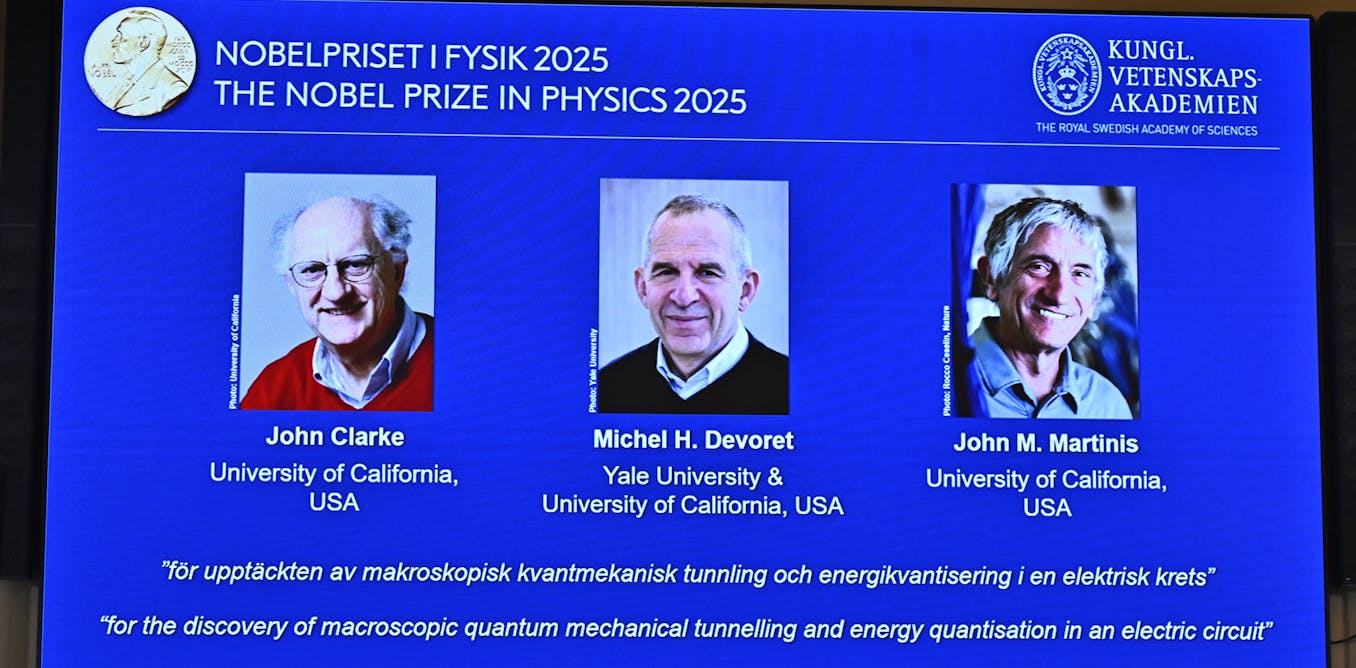Science
Nobel Physics Prize Honors Groundbreaking Work in Quantum Tunneling

The Nobel Prize in Physics for 2025 has been awarded to three prominent scientists for their pioneering research in quantum tunneling, an effect with significant implications for both medical devices and quantum computing. John Clarke, Michel Devoret, and John Martinis conducted transformative experiments approximately 40 years ago, fundamentally advancing our understanding of quantum mechanics. This award coincides with the centenary of quantum mechanics’ formulation, highlighting its historical significance.
Their groundbreaking work demonstrated quantum tunneling not just at the microscopic level, where particles can bypass barriers, but also in the macroscopic realm—visible to the naked eye. By showcasing this phenomenon in an experimental electrical circuit, the laureates laid the groundwork for future technological advancements, including improvements in mobile phone memory and the development of qubits, the building blocks of quantum computers. Quantum tunneling is also pivotal in superconducting devices, which conduct electricity with minimal resistance.
Understanding Quantum Tunneling
Quantum tunneling is a remarkable phenomenon where particles can appear on the opposite side of a barrier that would typically prevent their passage. First proposed in 1927, this counter-intuitive behavior was initially observed in tiny particles and is essential for explaining processes such as radioactive decay. The concept of macroscopic quantum tunneling, however, extends this idea to larger systems, revealing profound implications for technology.
The key to observing this phenomenon lies in the Josephson junction, a specialized form of electrical junction made from superconducting materials. Superconductors exhibit zero electrical resistance, allowing currents to flow indefinitely without energy loss. When two superconducting wires are connected by an insulator, the junction can surprisingly conduct electricity, defying conventional expectations.
The 1985 publication by Clarke, Devoret, and Martinis provided critical evidence of quantum tunneling in macroscopic systems. Their experiments involved cooling their apparatus to near absolute zero to minimize thermal energy, which could otherwise disrupt the tunneling effect. They discovered that below a certain temperature, the number of electrons escaping the barrier ceased to decrease, confirming their hypothesis of quantum tunneling at a larger scale.
Implications for the Future
Despite their significant contributions, the laureates have downplayed the importance of their findings. Yet, their research is foundational for today’s advancements in quantum physics. Quantum computing, in particular, promises to revolutionize technology, attracting substantial global investment. This innovation raises essential considerations about encryption and computational capabilities, with potential to solve complex problems unattainable by current supercomputers.
Presently, existing quantum computers rely heavily on the principles established by the 2025 Nobel laureates. Moreover, their work has initiated the use of superconducting quantum interference devices (SQUIDs), which measure minute variations in magnetic fields. These devices have valuable applications in mineral exploration and medical imaging, enhancing MRI capabilities and assisting in the mapping of brain activity for epilepsy management.
As the development of quantum technologies progresses, the timeline for widespread adoption remains uncertain. Nevertheless, the contributions of Clarke, Devoret, and Martinis have undeniably accelerated advancements in this cutting-edge field. Their work exemplifies the profound impact of fundamental research on future technological landscapes, inspiring new generations of scientists and innovators.
Rob Morris, an academic with no affiliations to interested parties, highlights the importance of this groundbreaking research in shaping the future of quantum technology.
-

 Health3 months ago
Health3 months agoNeurologist Warns Excessive Use of Supplements Can Harm Brain
-

 Health3 months ago
Health3 months agoFiona Phillips’ Husband Shares Heartfelt Update on Her Alzheimer’s Journey
-

 Science1 month ago
Science1 month agoBrian Cox Addresses Claims of Alien Probe in 3I/ATLAS Discovery
-

 Science1 month ago
Science1 month agoNASA Investigates Unusual Comet 3I/ATLAS; New Findings Emerge
-

 Science4 weeks ago
Science4 weeks agoScientists Examine 3I/ATLAS: Alien Artifact or Cosmic Oddity?
-

 Entertainment4 months ago
Entertainment4 months agoKerry Katona Discusses Future Baby Plans and Brian McFadden’s Wedding
-

 Science4 weeks ago
Science4 weeks agoNASA Investigates Speedy Object 3I/ATLAS, Sparking Speculation
-

 Entertainment4 months ago
Entertainment4 months agoEmmerdale Faces Tension as Dylan and April’s Lives Hang in the Balance
-

 World3 months ago
World3 months agoCole Palmer’s Cryptic Message to Kobbie Mainoo Following Loan Talks
-

 Science4 weeks ago
Science4 weeks agoNASA Scientists Explore Origins of 3I/ATLAS, a Fast-Moving Visitor
-

 Entertainment4 months ago
Entertainment4 months agoLove Island Star Toni Laite’s Mother Expresses Disappointment Over Coupling Decision
-

 Entertainment3 months ago
Entertainment3 months agoMajor Cast Changes at Coronation Street: Exits and Returns in 2025









